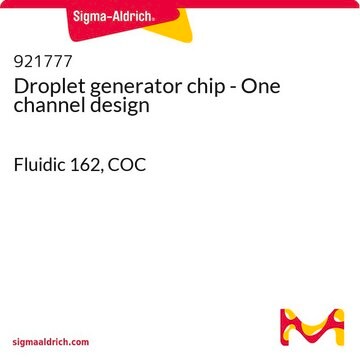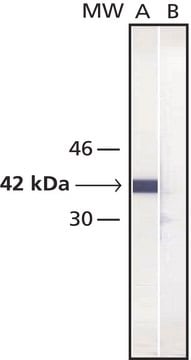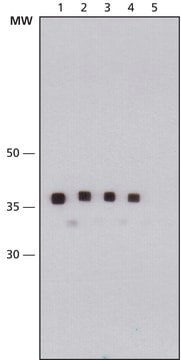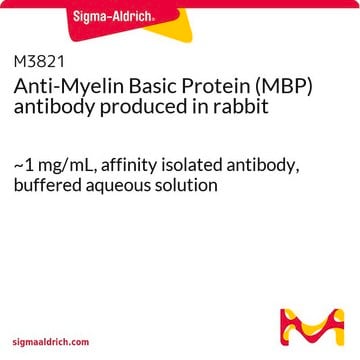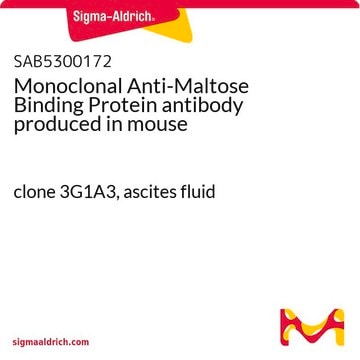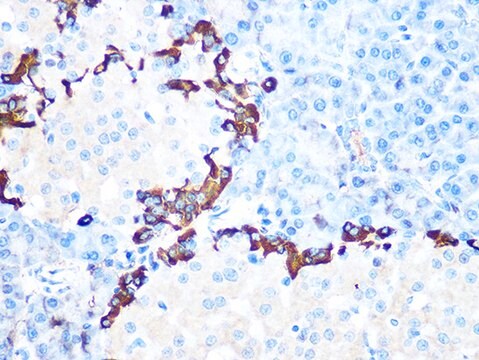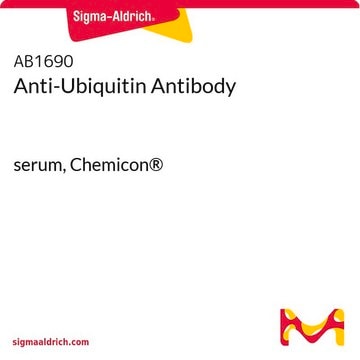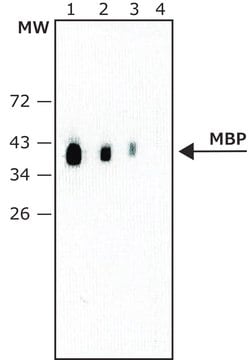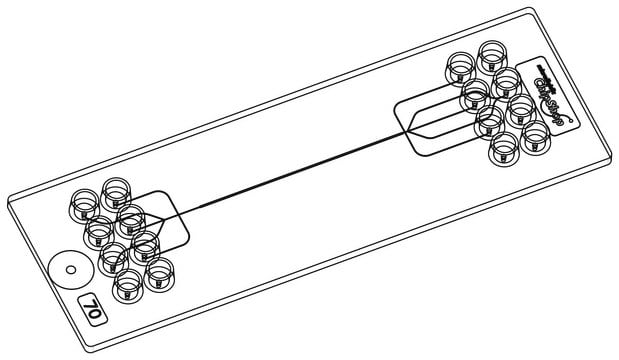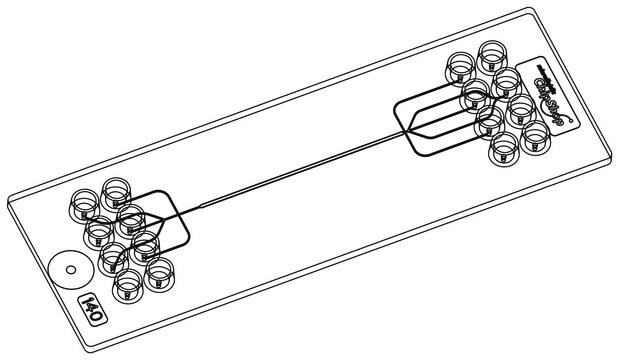AB3596
Anti-Maltose Binding Protein Antibody
serum, Chemicon®
Synonym(s):
MBP
Sign Into View Organizational & Contract Pricing
All Photos(1)
About This Item
UNSPSC Code:
12352203
eCl@ss:
32160702
NACRES:
NA.41
Recommended Products
biological source
rabbit
Quality Level
antibody form
serum
antibody product type
primary antibodies
clone
polyclonal
species reactivity
bacteria
manufacturer/tradename
Chemicon®
technique(s)
immunoprecipitation (IP): suitable
western blot: suitable
UniProt accession no.
shipped in
dry ice
target post-translational modification
unmodified
Gene Information
Escherichia coli K12 ... Male(948538)
Specificity
Maltose Binding Protein (MBP)
Immunogen
MBP, purified recombinant.
Application
Detect Maltose Binding Protein using this Anti-Maltose Binding Protein Antibody validated for use in IP & WB.
Immunoblotting: 1:500-1:3,000
Immunoprecipitaiton
Optimal working dilutions must be determined by the end user.
Immunoprecipitaiton
Optimal working dilutions must be determined by the end user.
Research Category
Epitope Tags & General Use
Epitope Tags & General Use
Research Sub Category
Epitope Tags
Epitope Tags
Physical form
Rabbit serum. Liquid. Contains 0.02% sodium azide.
Storage and Stability
Maintain at -20°C in undiluted aliquots for up to 12 months. Avoid repeated freeze-thaw cycles.
During shipment, small volumes of product will occasionally become entrapped in the seal of the product vial. For products with volumes of 200μL or less, we recommend gently tapping the vial on a hard surface or briefly centrifuging the vial in a tabletop centrifuge to dislodge any liquid in the container′s cap.
During shipment, small volumes of product will occasionally become entrapped in the seal of the product vial. For products with volumes of 200μL or less, we recommend gently tapping the vial on a hard surface or briefly centrifuging the vial in a tabletop centrifuge to dislodge any liquid in the container′s cap.
Legal Information
CHEMICON is a registered trademark of Merck KGaA, Darmstadt, Germany
Disclaimer
Unless otherwise stated in our catalog or other company documentation accompanying the product(s), our products are intended for research use only and are not to be used for any other purpose, which includes but is not limited to, unauthorized commercial uses, in vitro diagnostic uses, ex vivo or in vivo therapeutic uses or any type of consumption or application to humans or animals.
Not finding the right product?
Try our Product Selector Tool.
Storage Class Code
10 - Combustible liquids
WGK
WGK 1
Certificates of Analysis (COA)
Search for Certificates of Analysis (COA) by entering the products Lot/Batch Number. Lot and Batch Numbers can be found on a product’s label following the words ‘Lot’ or ‘Batch’.
Already Own This Product?
Find documentation for the products that you have recently purchased in the Document Library.
Imtiyaz Yaseen et al.
The EMBO journal, 37(2), 183-200 (2017-11-25)
Host cell defense against an invading pathogen depends upon various multifactorial mechanisms, several of which remain undiscovered. Here, we report a novel defense mechanism against mycobacterial infection that utilizes the histone methyltransferase, SUV39H1. Normally, a part of the host chromatin
Wen Zhou et al.
Cell, 174(2), 300-311 (2018-07-17)
Cyclic GMP-AMP synthase (cGAS) recognition of cytosolic DNA is critical for immune responses to pathogen replication, cellular stress, and cancer. Existing structures of the mouse cGAS-DNA complex provide a model for enzyme activation but do not explain why human cGAS
Haihua Feng et al.
Nucleic acids research, 48(19), 10940-10952 (2020-10-04)
ATR functions as a master regulator of the DNA-damage response. ATR activation requires the ATR activator, topoisomerase IIβ-binding protein 1 (TopBP1). However, the underlying mechanism of TopBP1 regulation and how its regulation affects DNA replication remain unknown. Here, we report
Andrea Izquierdo-Bouldstridge et al.
Nucleic acids research, 45(20), 11622-11642 (2017-10-05)
Histone H1 has seven variants in human somatic cells and contributes to chromatin compaction and transcriptional regulation. Knock-down (KD) of each H1 variant in breast cancer cells results in altered gene expression and proliferation differently in a variant specific manner
Fan Zhang et al.
Cancer research, 80(5), 999-1010 (2020-01-09)
53BP1 controls two downstream subpathways, one mediated by PTIP and Artemis and the other by RIF1 and MAD2L2/Shieldin, to coordinate DNA repair pathway choices. However, the upstream regulator(s) of 53BP1 function in DNA repair remain unknown. We and others recently
Our team of scientists has experience in all areas of research including Life Science, Material Science, Chemical Synthesis, Chromatography, Analytical and many others.
Contact Technical Service